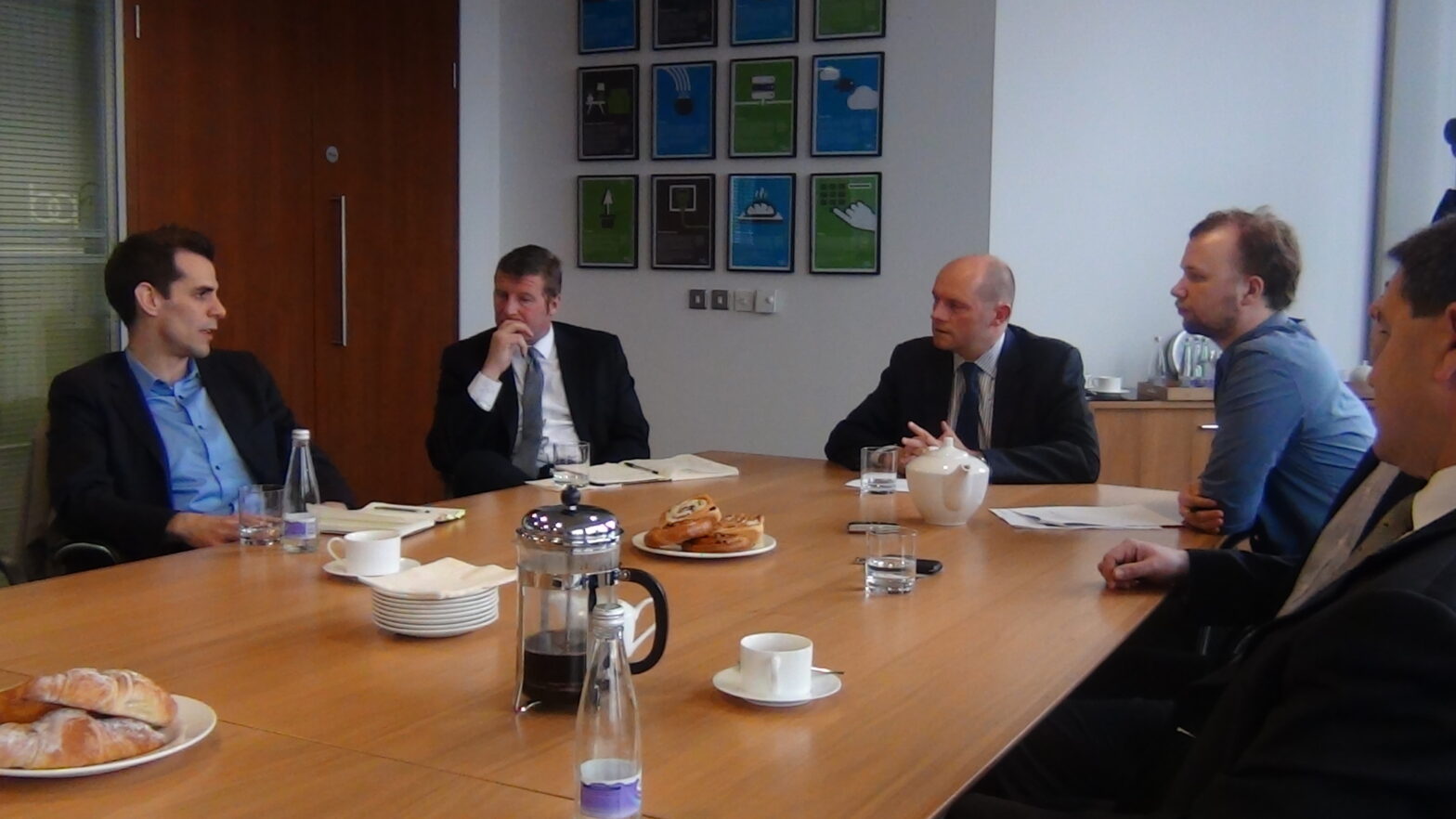The bank-backed Business Growth Fund (BGF) has supported 19 portfolio acquisitions during its two-year existence. To find out how acquisitions are helping its companies grow, GrowthBusiness organised a roundtable with GCI Com, Broadbandchoices.co.uk, Springfield Healthcare Group and Cennox to see how this is working in practice.
Richard Bishop, head of investments at the Business Growth Fund:
‘An important part of growth can be acquisitions, and that is one of the things we are keen to support, how have you all approached acquiring companies since the investment?’
Wayne Martin, CEO of GCI Com:
‘Post the BGF investment within the business we’ve acquired one small base. The investment to us was a vehicle to allow GCI Com to continue our strategic investments that we’ve made around network and technology expansion and skill sets where we were weak within the business so that we can bolster those capabilities right the way across the breath of the company.
‘So at this time we have acquired one small base, back in October 2012, and we have three bases/companies in play at this point in time.’
RB: ‘How do you decide what businesses you want to acquire?’
WM: ‘Historically it has been around gap analysis with regards to areas where we actually want additional skill and expertise in. GCI Com is a broad organisation now, the main basis for that is to offer business grade service level agreements and be accountable for the entire solution end-to-end.
‘The acquisitions now are either strategic or tactical, so it’s down to scale now; we have motioned strategic investments made. Going forward we are looking to grow the business with scale, bolting it on to platforms we’ve already built.’
Hunter Ruthven, editor of GrowthBusiness:
‘What framework have you got in place to make sure these acquisitions are integrated in a quick and efficient way?’
WM: ‘We have employed a new management team within the business and we’ve gone through a post investment plan. Historically the business grew very quickly, we had 19 acquisitions from 2000 up till 2012, so experience has enabled us to recognise the areas we need to integrate in.
‘If they’ve been technology acquisitions, we’ve been very focused around the engineering part of integration. If they have been more run-rate, then the business has been able to integrate those faster and slicker.’
RB: ‘Clearly culture is an important part of any acquisition, Graeme how do you access the culture of a business and whether it will work for you?’
Graeme Lee, group CEO of Springfield Healthcare Group:
‘For us, quality of care and the people we are acquiring are key points for Springfield. Part of our key strategy is acquisition, and we’ve certainly found that there is quite a lot of things to buy; it is making sure you buy the right thing.
‘Since the BGF has come aboard, Springfield has been able to accelerate what our acquisition targets might be and so we are able to look at two or three at the same time. Before, without the BGF, we wouldn’t have been able to do that.
‘We’ve also been able to resource more, so we’ve got more skills and management strength in being able to accelerate that acquisition programme. And currently we have one we are hoping to complete, and two very shortly after.’
HR: ‘Once you’ve these targets lined up, how many are acquisition ready and are you able to get them away quick enough?’
GL: ‘In the healthcare sector, especially in domiciliary care, they do a lot of the time need to get ready for sale. But actually, if they are not ready for sale, as long as the quality of care is there, we can put in the systems that they potentially don’t need. Therefore, what we are finding is that we may be able to get them at a lower multiple because of the fact they are not ready for exit.
‘So actually, we are quite keen to find businesses which aren’t necessarily ready for exit as we can assist them in that process, provided the business is worth investing in – the quality of the service is key. It could have great carers, really good policies and procedures, but their administrations might not be ready for exit and we can help them with that and support them in areas where small outfits can’t deliver.’
More from our exclusive Business Growth Fund roundtable:
- Marketing and new hires for companies after backing
- Capital expenditure for businesses post-investment
- Building out new products
- The Business Growth Fund: Two years in numbers
Michael Phillips, managing director of Broadbandchoices.co.uk:
‘We have a different size of challenge. We haven’t done any acquisitions yet, but the kind of businesses we are looking at are smaller, digital companies which might have large traffic, or a technology or product which we want to plug in. But because often they are smaller businesses, and as they are digital, there is an expectation around valuations.
‘So often, even with businesses which fundamentally aren’t ready to be acquired, there might be some value there – but they tend to be over valued. So we get the inverse, as someone is making a lot of money out of that business, as it is digital, but there is an absurd valuation.’
WM: ‘From a cultural perspective, now that we are 19 acquisitions in, GCI Com’s position is that it was the biggest unanticipated challenge we had in our business. We really planned well around due diligence and the importance of the process, but an area that due diligence is always weak in from my experience is the cultural thing, and how do you test that?
‘So I would be interested to explore areas for testing cultural fit within the business, but certainly from my experience you need a very strong management team to deploy your post acquisition plan very fast after an acquisition. This politics of play with the cultures and the people mean that the due diligence doesn’t bring that out. You find out the true colours after the acquisition, and that can be a big challenge for any business.’
RB: ‘Time is really important in that aspect, to have the time with the people who are selling the business – especially if they are planning to stay around afterwards. If they suddenly have a large amount of money for the first time in their lives, are they still going to be motivated to grow their business within your company. Or might it change them, and that is a judgement you have to make. Clive, how do acquisitions feature in your strategy?’
Company profiles from our exclusive roundtable:
Clive Nation, founder and chief executive of Cennox:
‘For us, the one key area which we need to expand into is the American market. We now have three acquisitions in the US, all of which have failed primarily because of the sellers changing tack or cutting cost complications with their financiers, especially with private equity if they are selling out. Overvaluation appears to be a big issue in the States.
‘But it is a key strategic requirement for us as the amount of business we do in the US, compared with the rest of the world, is so small to what it could be – and it’s the world’s largest market for us. And to grow organically is not feasible, so we¹re looking for a partner where the owner is looking to exit, and acquire it that way, but it is proving to be a big challenge.’
RB: ‘Michael, overvaluation has appeared as a theme and, looking at the digital world, how are you going to decide whether to take that plunge?’
MP: ‘Someone once said to me that when you are looking at acquisitions, one and one needs to be three, it can¹t just be two. So the sort of things we are looking for at the moment are: can we apply our technical platform and monetise traffic more effectively; do we think it will have a very big accelerative affect.
‘Rather than just buying profitability, it has to have a more empowering effect on the overall business, and that is particularly relevant when you expanding into overseas markets. Although the organic plans we’ve got we’re quite comfortable, I can certainly see there will be a logic for using M&A to accelerate that in the future.’
GL: ‘What we’ve found, particularly with the two acquisitions we¹re now front-runners for, is that because the BGF is onboard it has helped either with the seller or the agent to get comfortable with who we are and they have seen us as the more likely person they’ve wanted to do the deal with.’
This feature is part of a larger package looking at the Business Growth Fund’s active portfolio. See links above for more content.






